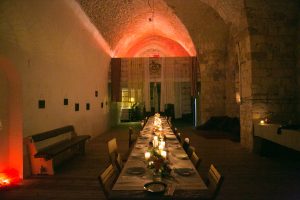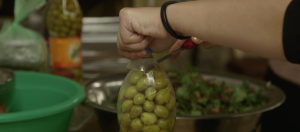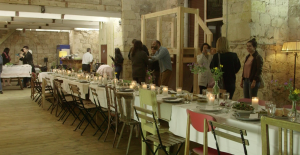Family Dinners Project Part 6 of 6
Food has always been a representation of class, time, and power. It creates a unique atmosphere conducive to encounter. Sharing food sets the table with aspects of hospitality, distribution, exchange, familiarity, and pleasure. A shared meal can become a space for reflection on socio-political realities, attitudes, fashions of the time, and even the suppressed elements of history.
In a research project that documents Palestinian food practices, initiated by artist Mirna Bamieh and supported by the Public Program of A. M. Qattan Foundation, “Family Dinners” is a series of five dinners that were served over a two-month period to groups of food enthusiasts. This article is the last in the series that describes these dinners.
“Palestine on the Restaurant’s Table” was the fifth and last dinner of Family Dinners and was put together by Momen Tayeh, a young chef whose passion for cooking made him skip high school classes in Tulkarem and enroll in culinary school in Ramallah; initially without his parents’ permission or knowledge. Together with his family, Momen created a number of dishes that he had eaten as he was growing up and that he prepared in his own way to reflect his passion and dedication in elevating the Palestinian kitchen to restaurant-quality standards. Dishes such as hand-rolled maftoul, bisara (fava beans with mulokhiyyah, Arab’s mallow or Nalta jute), arrayes (grilled pita stuffed with kufta, i.e., minced meat), spinach tabbouleh, khabisa (a carob molasses-based muhallabiah, i.e., a dessert prepared with condensed milk and rice powder), and delicious ka’ek stuffed with wheat and cinnamon.
The dinner was presented on a table hosted by Beit al Sa’, a cultural center that has proved its vitality and importance in Tulkarem, for an invited group of guests from the food industry, such as Chef Ashraf al-Hajjeh, Chef Jumana Hasan, and food-and-beverage specialist Hatem Taha. The discussion around the dinner table focused on the place of Palestinian food on the professional gastronomy scene both locally and internationally, with several reflections on restaurant practices in Palestine, especially in Ramallah, a city that presents itself as the center of life in the West Bank, a city whose skyscape is filled with billboards and whose streets are filled with people struggling to keep up with bank loans, a city where entertainment places are mostly restaurants and bars that are overpriced when compared to average salaries. A city whose inhabitants are in a constant state of trying to live a normal life. Yet frustration is always lurking – political frustration, urban frustration, economic frustration, frustration on an even more mundane level, for example, going to a restaurant and expecting good food and a change of air, yet encountering a tasteless mayonnaise-filled Caesar salad.
During the dinner, we wondered about the restaurant projects that seem to fail even before they come alive, sabotaging any creative vision and relying solely on what they think the customers expect. These restaurants produce identical menus, where the Italian is not really Italian, and the Mexican is not really Mexican; the Palestinian food section is limited to grilled meats and some other redundant items, which, unfortunately, usually lack flavor and innovation. Recently, the number of restaurants in the city has mushroomed, with each promising a new gastronomic experience though relatively few make good on their promise.
Given that restaurant menus reflect one way that we affirm our social identity, the reality shows that we seem to have forgotten how to dream and how to imagine a future without disappointment. This was the theme of our dinner that night – the lack of vision in the restaurant industry.
The Palestine Hosting Society aspires to counter this situation of atrophy through the creative tables projects. We are driven by a desire to start an honest conversation through food that raises awareness and is an expression of Palestinian heritage in today’s milieu. We hope that this will lead us to remember the abundance and creativity of our Palestinian kitchen. And maybe the menus that reflect this pride and knowledge will lead to a new wave of restaurants that aim to create a dynamic of greater food awareness in Palestine and have a positive influence on the choices we make about what we eat, where it comes from, and how it’s prepared.
This Week in Palestine extends its thanks to Mirna Bamieh and Palestine Hosting Society for the contribution of the last six articles that added much value to TWiP Kitchen.




